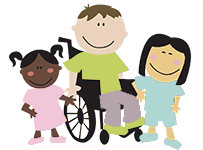As children develop speech and language, we typically see a natural progression in their expression and reception of language. Expressive language refers to a child’s ability to produce language. This includes their vocabulary (semantics), grammar (morphology), use of language (pragmatics), and sentence length and structure (syntax). All three components make up what is known as expressive language. A child can have difficulty in one or all three areas. Receptive language refers to a child’s ability to understand what they see or hear. When children have difficulty with receptive language, we often see problems with comprehension. These deficits become apparent when he/she has difficulty answering questions, following directions, or listening.
 Symptoms of Expressive Language Delay
Symptoms of Expressive Language Delay
- Develops first word after 18 months
- Does not use 2-word combinations by 24 months
- Has smaller vocabulary than peers
- Does not use grammar forms -ing by 24-30 months and is by 30 months
- Confuses pronouns
- Reduces sentence structure (e.g., “No go” instead of “I don’t want to go.”)
- Leaves listeners confused
Symptoms of Receptive Language Delay
- Has difficulty understanding simple directions or body parts by 18 months
- Has poor word identification by 18-24 months
- Misunderstands advanced sentence structure (“Take your shoes off after you go inside.”)
- Does not know what answer to give to questions
- Exhibits poor listening skills
*Typically a child’s reception or understanding of language is better than their expression or production of language.
Expressive and receptive language can affect a child’s ability to interact with peers and perform in school. Speech-language pathologists have strategies that can facilitate a child’s expressive and receptive language and thus help them become more successful in the classroom.
It is important as children develop that parents are aware of typical language progression. The American-Speech-Language-Hearing Association has good guidelines for parents on language development. The stages that children go through in developing language are very consistent even though the age they hit the milestones can vary a lot. It is especially important for parents who are concerned about their child’s language development to have them assessed by a certified speech-language pathologist so that intervention can begin as early as possible. Studies show that early intervention is extremely important in a child’s ability to catch up with their peers.
Written by Laura Upton, MS, CCC/SLP

Comments (0)